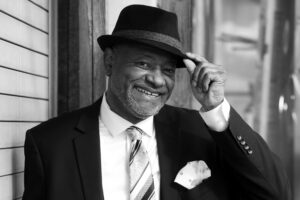
Lenard D. Moore is, simply put, a prolific writer. Moore has published in over thirty genres. His work has been translated into more than twenty languages and has been widely anthologized. A master of Japanese poetic forms, Moore is one of a handful of African American poets who regularly publishes haiku, tanka, senryu, renga, renku, rengay, tanrenga, and haibun. He began publishing poetry in 1980 – in the Fort Eustis Wheel – while serving in the military while stationed in Virginia. He won his first poetry competition in 1981 while serving in Stuttgart, Germany. His dedication to haiku is rivaled only by his success in it: he was awarded the Haiku Museum of Tokyo Award in 2003, 1994, and 1983. Three of his poetry collections, Desert Storm: A Brief History (1993), Gathering at the Crossroads: The Million Man March (2003), and A Million Shadows at Noon (2023) offer full narratives unfolded entirely in haiku. Moore also served as the first Southerner and the first African American president of the Haiku Society of America (2008 and 2009). He also holds the distinction of being appointed as the honorary curator of the American Haiku Archives at the California State Library in Sacramento. Though he is clearly a haiku master, the reach of Moore’s poetry is broad, though clearly connected, to all of the spaces that he calls home. He is a storyteller whose work is enlivened by the music and rhythms that define these intersecting cultures. His poetry speaks to his identity as an African American writer and as a Black Southerner.
Born in Jacksonville, NC, in 1958, Moore is the oldest child of a large military family. He grew up in segregated Onslow County, NC, best known for its beaches, its farms, and its fossils. It is noteworthy for the timeless beauty of its shores including Topsail Beach and Hammock’s Beach, known for being two of the few beaches in the state that welcomed Black beachgoers and homeowners. True to his Onslow County roots, Moore is attuned to the land, a focal point of his upbringing in Eastern North Carolina. He has noted that his writing is deeply rooted in the soil of the land that he tended as a teenager whose love of language flourished alongside his love of growing and tending the garden that he began to oversee when he was twelve. Moore’s writing invites readers to a world shaped by the storytelling and ancestral wisdom-trust that were shared during the rituals of planting, nurturing, harvesting, and the bountiful meals that define his family culture. True to this tradition, Moore’s poetry, short stories, and essays – over 500 in all appearing in Black American Literature Forum, Callaloo, African American Review, Jazz Journal, Journal of Ethnic American Literature, Obsidian, and Southern Cultures, among others–testify to the critical reception of his work. In addition, Moore’s work has been the subject of several monographs, theses, and dissertations published in the U.S. and abroad. He is a writer whose work has truly migrated across the world.
Although his work has an international reach, Moore is truly a son of North Carolina. He earned his M.A. degree in English with a focus in African American Literature from North Carolina A&T State University, and also took creative writing classes at North Carolina State University with Gerald Barrax and Angela Davis-Gardner. He is also a graduate of one of the oldest historically Black universities in the South, Shaw University, where he earned his B.A. degree with honors. As a creator, scholar of, and professor of Creative Writing, he has trained and inspired students at Enloe High School, North Carolina State University, Shaw University, North Carolina A&T University, and the University of Mount Olive (formerly Mount Olive College). He continues to inspire the poets of the next generation.
Above all, Moore is a writer’s writer. His commitment to writing every day is visible in the pads and pens that are as ever present with him as his signature hats and suits. He consistently uses his writing to leverage the moments that, as he writes in his poem, “Double Exposure, “leave an aching to know” (Moore, A Temple Looming, 37). The hundreds of texts that comprise the body of his work are found in numerous anthologies, including The Bedford Introduction to Literature, The Southern Poetry Anthology, The Haiku Anthology, 27 Views of Raleigh, Obsession: Sestinas in the Twenty-First Century; Villanelles, and Black Nature: Four Centuries of African American Nature Poetry, to name only a few. One of his abiding legacies is work that he has done in community and communion with other African American poets as the founder of the Carolina African American Writers Collective, the co-Founder of the Washington Street Writers Group, and a Cave Canem Fellow (1998-2000). In addition to his haiku awards and this notable induction into the North Carolina Literary Hall of Fame, Moore has received the Indies Arts Award (1996), Margaret Walker Creative Writing Award (1997), the Heron’s Nest Award (2004) Valentine’s Award (2005), the Sam Ragan Fine Arts Award (2006), North Carolina Award for Literature (2014), Furious Flower Laureate Ring (2014), and is the recipient of a Soul Mountain Retreat Fellowship (2007). In 1997, Moore was selected as one of the eighty poets invited to read at Gwendolyn Brooks’ 80th Birthday Celebration. These are only a few of the recognitions he has received for the power of this poetry.
One of the primary characteristics of his poetry is the primacy of its music. A lover of jazz, gospel, and the blues, the echoes of this music of all kinds define his entire oeuvre. Jazz is the framework of most of his work, though it is fully realized in his most recent full-length poetry collection, The Geography of Jazz (2020). As he notes in an interview, he has been “digging that mood — bebopping up sidewalks, styling the black fedora that I called my sky-piece, imagining jazz colors: blue, orange, and purple” for decades (Moore, “Poetry in Motion: A Writer Takes His Cue From Jazz”). His intimate understanding of the power and nuances of jazz has enabled him to contribute significantly to the body of work of jazzku, gospelku, and bluesku. For Moore, jazz is inseparable from his coming of age in North Carolina and the work of words. “At the Train Stop” speaks to the heart of this intersection of jazz and his Black, North Carolina roots when he writes of his determination “to imagine Monk/glows like Carolina sun/in cloudless blue sky.” The poem ends with a conflation of notes and words: “if notes were visible/perhaps they would drift crimson/shimmer like autumn leaves.” Here, too, Moore is highlighting the long history of jazz musicians who have and continue to create in North Carolina. His exploration of the intricacies of jazz improvisation enabled him to offer his poetry as spoken word presentations accompanied by jazz musicians across the country. However, it is also critical to note that he has also worked with visual artists, dancers, and in concert with other writers in live performances during which they co-create together, including Cyrus Chestnut and Vijay Iyer. Like the riffs of beloved songs, his writing continues to connect him with students he taught decades ago through his ongoing work as a songwriter and spoken word artist. The multiple dimensions of Moore’s work resonate with his limitless devotion to the power of words to change, explain, and inspire.
Moore also weaves the themes of family throughout his work, a salute to his own family’s wisdom-tradition of griots, storytellers whose narratives capture the narratives of family, the culture that defines them, and histories that impact them. As he writes in his ekphrastic poem “It Begins with Middle Passage,” “Blood remains rich in the children like we words,” a message that speaks to generations, past and future, whose stories are “deeper than skin” (Moore, “It Begins with Middle Passage,” A Temple Looming, 51). The power of family, as Moore reminds us, cannot be diminished, even in death. And Moore knows this more surely than most. He has had the mixed blessing of writing with and about his late daughter, Maiisha, whose “bird-quick words” make him “believe in inquiry” serves as the muse for his work (Moore, “A Reminiscing Daddy,” All the Songs We Sing, 79).
Like Whitman, though, the poetry of Lenard Moore contains multitudes, and the impact of his time in the military and his compassion for men and women who have experienced war also resonates throughout his work. In addition to poetry in Desert Storm: A Brief History (1993), the experience of military men and women come to life in his work. Desert Storm, comprised of 136 haiku intended to be experienced as one long poem, focuses on the war in the Persian Gulf. He captures the fullness of the human experience in “Sunday morning/a black GI prays/inside his tent.” However, Moore also writes about the Vietnam War, which defined his childhood. His father served two tours of duty in the war. As a child of the 1960s, Moore intimately knew the war as well as its impact on the shifting terrain of home for Black soldiers. He is clear about the impact of this in “Lejeune Boulevard: Jacksonville, North Carolina,” as the persona focuses on the “freshly dug holes” of a memorial tree project, a process which fails to offer healing for the persistent ways that war lingers in the heart, mind and spirit.
The body of Lenard Moore’s work is in its totality, though, a healing art. In addition to the poems that focus on the folk healing traditions of Black Southerners in poems like “Remedy: Onion” and “Remedy: Sassafras Tea,” it is clear that Moore’s work is offered as a balm, cataloging of all the ways that we are might celebrate and our own humanity (Southern Quarterly, vol. 53, no. 3–4, Mar. 2016, p. 209 – 10). It is in his poetry that his life’s purpose is most revealed. His is the art of human connectedness, one marked by creativity of generations of storytellers and shared through the jazz of a word master.
